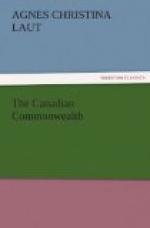On the other hand, Canada’s dependence on England is even more tenuous. Does a question come up as to the “twilight zone” of provincial and federal rights, it is settled by an appeal to the Privy Council. Suits from lower courts reversed by the Supreme Court of Canada can be appealed to England for decision; and in religious disputes as to schools—as in the famous Manitoba School Case—this right of appeal to Imperial decision has really been the door out of dilemma for both parties in Canada. It is a shifting of the burden of a decision that must certainly alienate one section of votes—from the shoulders of the Canadian parties to an impartial Imperial tribunal.
If there be any other evidence of bonds in the tangible holding Canada to England and England to Canada—I do not know it.
II
What, then, is the tie that binds colony to Mother Country? Tangible—it is not; but real as life or death, who can doubt, when a self-governing colony voluntarily equips and despatches sixty thousand men—the choice sons of the land—to be pounded into pulp in an Imperial war? Who can doubt the tie is real, when bishops’ sons, bankers’, lawyers’, doctors’, farmers’, carpenters’, teachers’ and preachers’—the young and picked heritors of the land—clamor a hundred thousand strong to enlist in defense of England and to face howitzer, lyddite and shell? Why not rest secure under the Monroe Doctrine that forever forefends European conquest? It is something the outsider can not understand. President Taft could not understand it when his reciprocity pact was defeated in Canada partly because of his own ill-advised words about Canada drifting from United States interests. Canada was not drifting from American interests. In trade and in transportation her interests are interlinking with the United States every day; but the point—which President Taft failed to understand—is: Canada is not drifting because she is sheet-anchored and gripped to the Mother Country. We may like it or dislike it. We may dispute and argue round about. The fact remains, without any screaming or flag waving, or postprandial loyalty expansions of rotund oratory and a rotunder waist line—Canada is sheet-anchored to England by an invisible, intangible, almost indescribable tie. That is one reason why she rejected reciprocity. That is why at a colossal cost in land and subsidies and loans and guarantees of almost two billions, she has built up a transportation system east and west, instead of north and south. That is why for a century she has hewn her way through mountains of difficulty to a destiny of her own, when it would have been easier and more profitable to have cast in her lot with the United States.




